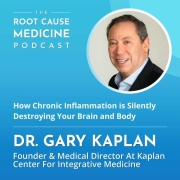Changing behavior is hard. Changing the way we think about a topic, an issue, or a pattern that we routinely engage in is hard. In fact, making change is so difficult that there’s an entire field of psychology dedicated to it. It’s the science of behavioral change and it looks at how we make change successfully and why.
Whether it’s the ability to start exercising, eating healthier foods, or just doing things to reduce stress levels, change takes effort. For example, study after study shows that after starting a new diet, most people will eventually regain the weight they lost. Experts think that as many as 80 to 95% of dieters gain back the weight they worked so hard to lose. Although that’s a bit disheartening, the point is that making meaningful and lasting change is a process and not a quick fix. This is true for many things, but it is especially true for lifestyle habits that impact our health. And this is where lifestyle medicine enters the picture.
What is Lifestyle medicine?
Lifestyle medicine is a field of medicine that uses behavioral change psychology to help tackle the rising levels of chronic disease. Chronic problems like heart disease, obesity, stroke, hypertension, cancer, and diabetes are among the most prevalent and costly health conditions in the United States. Consider that approximately 60% of all Americans suffer from at least one chronic disease; and this number is only increasing.
Lifestyle medicine can play an important role in the management of chronic disease because many of these conditions revolve around the same lifestyle issues – exercise, healthy eating, restful sleep, ideal body weight and reducing the esposure of harmful substances. Furthermore, promoting healthier habits and reducing stress can serve as an important tool for lowering inflammation and mitigating pain and depression – components of many chronic diseases. We know from research that engaging in certain positive lifestyle changes early on can dramatically lower the risk of developing these illnesses in the first place.
Lifestyle medicine focuses on these key aspects of health:
Physical activity
Study after study shows that regular and consistent physical activity is one of the best ways to improve mood, health, and longevity.
Stress
Periods of stress that come and go are natural but if stress becomes a constant part of an individual’s life, it can have negative impact on health. Ongoing stress can affect heart health, digestion, mental wellbeing (mood, focus), and physical health.
Nutrition
Research has highlighted the benefits of a healthy and nutrient-rich diet in lowering inflammation and reducing the risk of heart disease, high blood pressure and other medical conditions. The role of good nutrition in overall wellbeing cannot be understated.
Restorative sleep
Good sleeping patterns and habits can help bolster the immune system, remove waste products from the brain, improve focus and physical energy, and help lower the risk of stroke, obesity, heart disease and high blood pressure.
Mental health
Human beings are social creatures and meaningful social connections make up a large part of one’s mental and spiritual well-being. Research has shown that individuals who have stronger social connections are more resilient and less likely to develop cognitive impairment.
Lifestyle medicine attempts to address all of these areas. It does not mean that all of these items need to be fixed in a jiffy; it just means that the importance of these factors and their role in good health should be recognized. If there is a particular area where changes can be made to improve your health, then a discussion should be had with your provider.
Where do you begin?
The first step is being open to change; self-motivation is key. You should educate yourself and be open to understand the benefits of the change you want to make to keep you motivated and focused on your goals. Can you foresee some challenges? Try o identify any barriers that are keeping you from moving forward and be prepared to deal with setbacks because they will happen. Be forgiving and keep moving forward.
For many, having an accountability partner or being a part of a structured program that considers the key aspects listed above can be the difference between success and failure. Lifestyle program teams are trained and experienced in these challenges and are supportive to those who are ready to embrace these changes.
Lifestyle medicine is relatively new as a field of practice and its principals are very similar to those of functional medicine (functional medicine also investigates and treats the root cause of disease and dysfunction). It sheds light on the importance of the day-to-day activities that we undertake, how they impact us, and why small changes can make a huge difference. Although change is hard, it is possible, and lifestyle medicine speaks to the tools and resources that we can use to help bring those positive changes about.
We are here for you, and we want to help.
Our goal is to return you to optimal health as soon as possible. To schedule an appointment please call: 703-532-4892 x2
References
https://www.acpm.org/initiatives/lifestyle-medicine/
https://www.ncbi.nlm.nih.gov/pmc/articles/PMC5876976/
https://health.clevelandclinic.org/why-people-diet-lose-weight-and-gain-it-all-back/
https://www.cdc.gov/chronicdisease/index.htm
https://pubmed.ncbi.nlm.nih.gov/21056174/
https://www.hopkinsmedicine.org/health/wellness-and-prevention/the-science-of-sleep-understanding-what-happens-when-you-sleep
https://www.ncbi.nlm.nih.gov/pmc/articles/PMC9985951/





